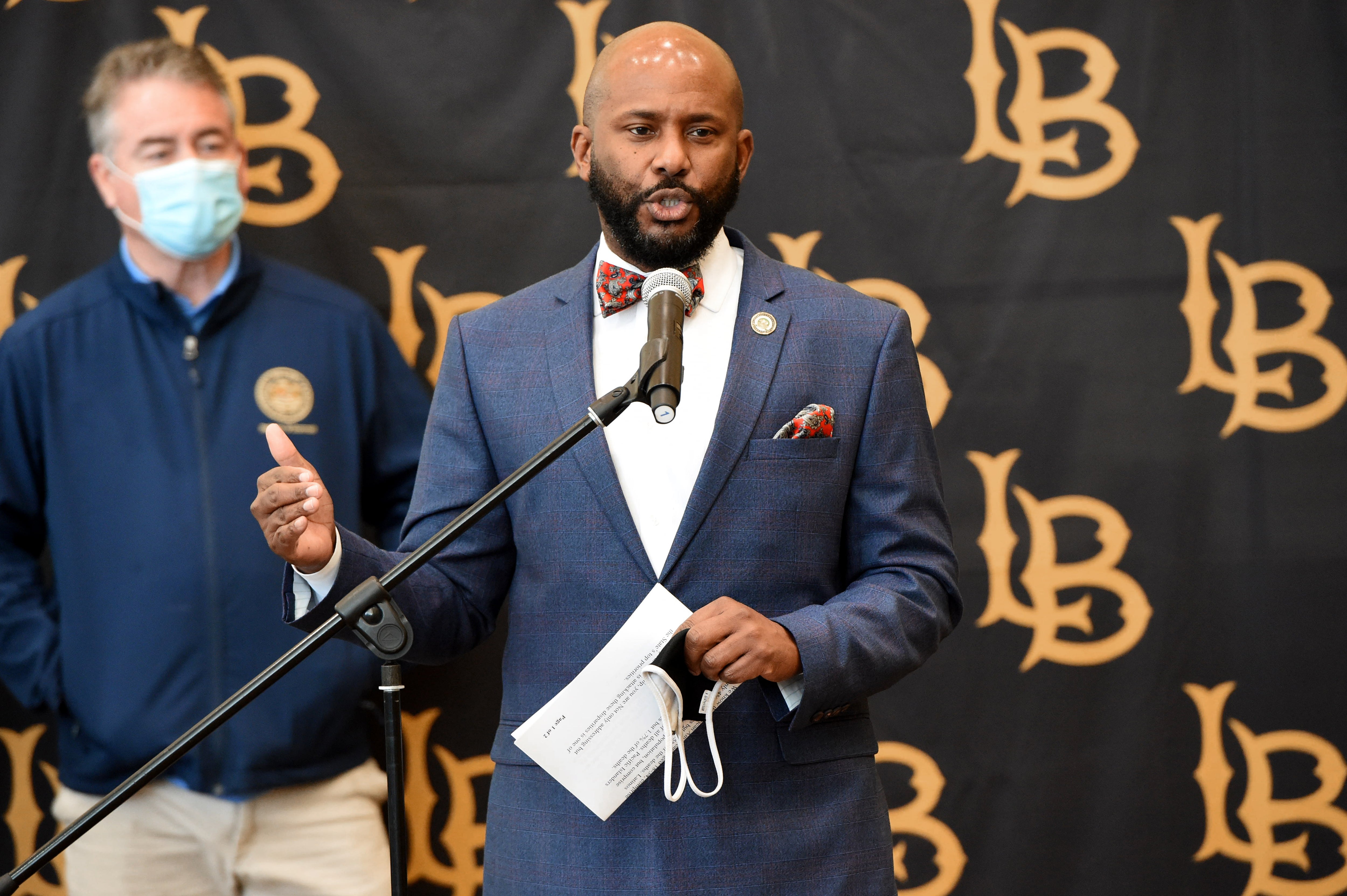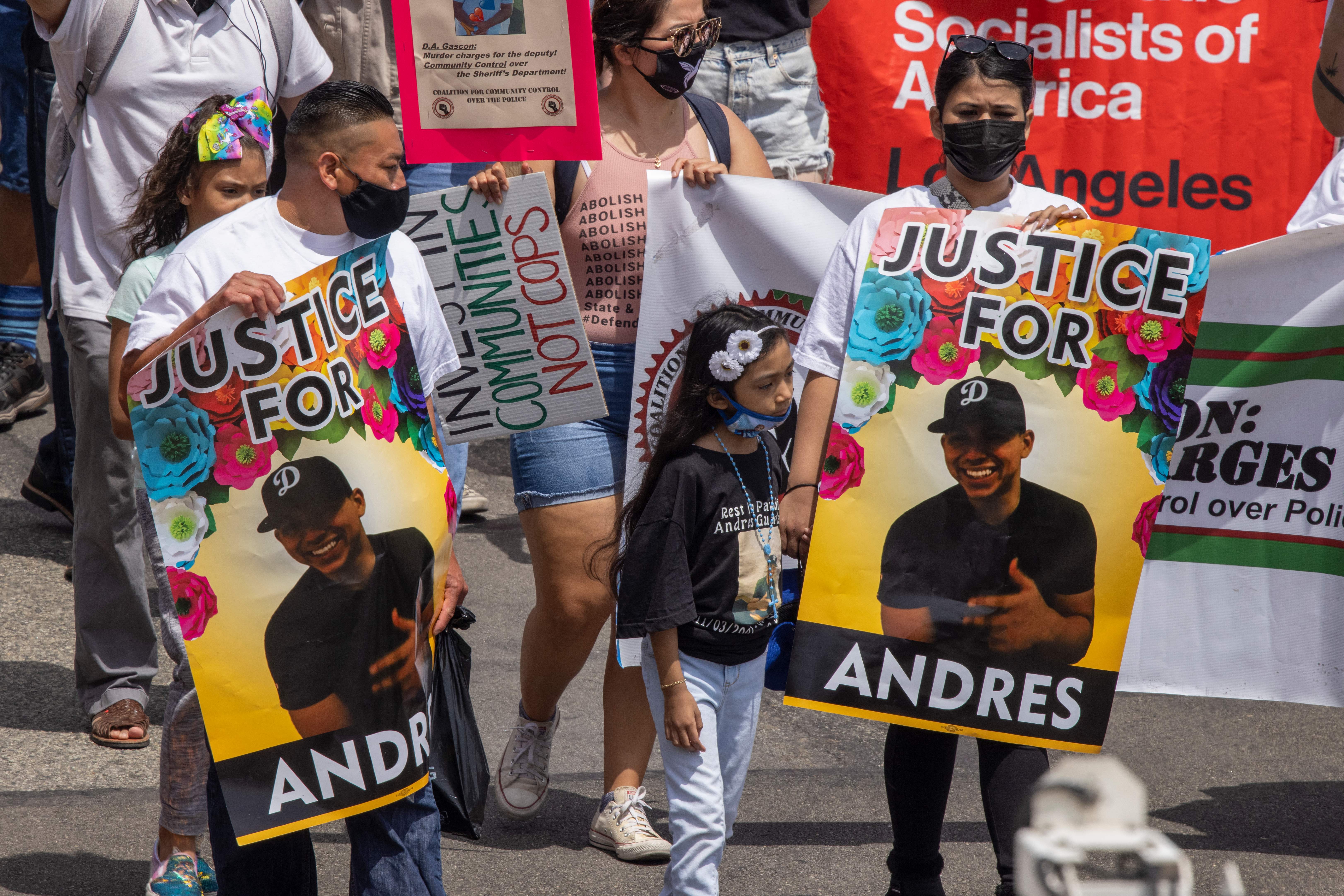The ex-cop trying to bring down LA’s ruthless police gangs: ‘It’s absolutely crazy but it exists’
Tackling violent groups made up of law enforcement agents is part of creating a vision for 21st century policing in California, Mike Gipson tells Andrew Buncombe


Your support helps us to tell the story
From reproductive rights to climate change to Big Tech, The Independent is on the ground when the story is developing. Whether it's investigating the financials of Elon Musk's pro-Trump PAC or producing our latest documentary, 'The A Word', which shines a light on the American women fighting for reproductive rights, we know how important it is to parse out the facts from the messaging.
At such a critical moment in US history, we need reporters on the ground. Your donation allows us to keep sending journalists to speak to both sides of the story.
The Independent is trusted by Americans across the entire political spectrum. And unlike many other quality news outlets, we choose not to lock Americans out of our reporting and analysis with paywalls. We believe quality journalism should be available to everyone, paid for by those who can afford it.
Your support makes all the difference.A California politician who once served as a hands-on policeman is spearheading efforts to reform law enforcement in the state – by banning everything from deadly chokeholds and restraints, to the officers’ own gangs that have been accused of intimidation and murder.
Mike Gipson, an assembly member whose district includes parts of south Los Angeles and the city of Compton, says it is time for a new vision of police in the nation’s most populous state, and where between 2013 and 2021, at least 1,402 people were killed by officers.
While it ranks the 14th-deadliest state for police killings per capita, he says the sheer scale of the numbers, and the fact the nation’s biggest sheriff’s department – Los Angeles County – is allegedly riddled with police gangs and illegality, makes it ripe for reform.
“We are reimagining what law enforcement looks like in the state of California,” he tells The Independent. “We’re trying to make sure we have officers who are held accountable. Residents in constituencies across California are demanding more accountability when it comes to police officers, and police officers using deadly and lethal force.”
In recent weeks, Gipson, 54, has introduced two bills, Assembly Bill (AB) 490, that would ban police from placing suspects into prone positions, which can cause people to die from what is known as positional asphyxia.
It supplements a bill passed last year, AB 1196, that banned officers from using chokeholds or “carotid restraints”, of the type used by Minneapolis police officer Derek Chauvin when he murdered George Floyd last year.
A third bill that Gipson is sponsoring, AB 958, would make it a firing offence for an officer to be a member of a police gang, or clique. California, in particular Los Angeles, is notorious for being home to almost 20 reported gangs.
It is alleged the police gangs, which have names such as The Executioners and The Banditos, operate in much the same way as the gangs police vow to confront in their duties, with violent and sometimes deadly initiations, gang tattoos and corruption. Authorities have long been accused of failing to root out the police gangs, whose members have allegedly been involved in the killing of civilians, as part of their entry to the gang.
“That’s absolutely crazy, but it exists,” he says. “And the only way you can be initiated in these gangs, is that you have to use excessive force or lethal force, on someone.”
He adds: “But there’s one deputy sheriff in Compton, who refused to be part of that gang, and who was ridiculed and who was bullied, who was placed in an unsafe position after he said enough is enough, after five years and exposed it.”
He says the bill would mean officers who are found to be members of such gangs would be fired. “It is absolutely mind boggling we’re doing this in 2021, but we have to because it still exists in our communities.”

In a statement, the Los Angeles County Sheriff’s Department said: “Sheriff Alex Villanueva was the first sheriff in the history of LASD to implement a strict policy prohibiting cliques and sub-groups, and he has repeatedly demonstrated his commitment to transparency and accountability.
“We can also say, the Los Angeles County Sheriff’s Department expects all of its members to hold themselves to the highest ethical and professional standards at all times. Those who allegedly engage in criminal misconduct will be investigated and prosecuted to the fullest extent of the law.”
Gipson is not the only politician or activist pushing for police reform in California. Kevin McCarty, a Democratic assembly member who represents Sacramento, last year was the sponsor of two bills, one that established a investigative unit within the Department of Justice to oversee investigations of officer-involved shootings, and a second that gives county officials more oversight of sheriff’s departments.
Also in May, the California Senate passed SB 2, a bill that is seen as a key plank of Democrats’ efforts at reform, and which would permit officials to decertify officers fired for misconduct or convicted of certain crimes “against public justice”. Right now, California is one of just four states that does not have such legislation, designed to stop “bad apple” officers being employed by another force if fired from their jobs.
The bill’s sponsor, state senator Steven Bradford, told Politico the reforms were part of “a tidal wave.”
“We’re seeing it in the streets, we’re seeing it in our communities, we’re seeing it across this country,” he said.
There is particular interest in Gipson’s efforts because of his hands-on experience as a police officer in the city of Maywood, south-east of Los Angeles.
He says key to his work as an officer was engaging with the community, something he believes every person in uniform should be attempting.
“I knew the different families that lived in the community. We need to make sure that that we go back to those days where people are supportive of the police, and not fearful of the police, to that extent we all try to work and make our communities better,” he says.
“We don’t want law enforcement to think that our communities are the enemy, no more than we want a community to think that law enforcement is the enemy, but we also have to face the realisation there are bad apples. There are bad apples in uniform.”
The decision to author the bill that would prevent officers putting suspects, or people they encounter, in prone positions followed the death last December of a 30-year-old Asian-American, Angelo Quinto, whose family had called the police in Antioch after he suffered a mental health episode.
As it was, police ended up handcuffing him, and leaning on him for five minutes and him falling unconscious. He never regained consciousness and died three days later in hospital; his family believe he was asphyxiated by the police’s actions, though the force has defended its response.
“I was watching it the whole time. I was there. I saw everything unfold in front of my eyes in our bedroom,” said his mother, Maria Cassandra Quinto-Collins.
“Whatever they did, kneeling on his neck, the whole time, it’s all unnecessary, because he wasn’t resisting. He did not resist. He wasn’t violent. He was calm.”
The case of her son was among five police-involved deaths of men of colour highlighted by The Independent to mark the anniversary of the murder of George Floyd, and draw attention to more than 400 cases in the last 12 months.
In the city of Alameda, another young man, Mario Arenales Gonzalez, died in April after police pinned the unarmed 26-year-old to the ground and pressed on him. Three investigations are underway, and a lawyer for the family has demanded an outside investigation by the FBI.
“Assembly Bill 490 is appropriately, and I want to underscore appropriately, titled the Angelo Quinto Act of 2021. We’re going to say his name. We want justice for Angelo, we want a full investigation into the murder of Angelo Quinto,” says Gipson.
He says because the law prohibiting chokeholds or neck restraints had not yet come into effect at the time, there was less his family could do in its efforts to seek justice.
“But moving forward, police officers, applying those kinds of techniques will be held accountable,” he says.
“Anytime you cut someone’s oxygen ability to breathe, we’re saying that’s excessive, that is lethal force, and should not be used by any law enforcement officer in the state of California.”
Earlier this month, the bill was passed by the assembly and moved to the Senate.
“My bill still allows officers to protect themselves in life-threatening situations, but it does not allow them to cut off anyone’s airway,” Gipson said after it passed the lower chamber.
“The circumstances of Angelo Quinto’s death are a stark parallel to George Floyd’s, which both exposed loopholes in use-of-force policies.”
Join our commenting forum
Join thought-provoking conversations, follow other Independent readers and see their replies
Comments